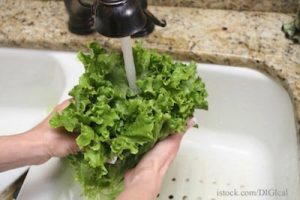The USDA has put out a food info sheet about safe food handling and washing food. Does this practice promote food safety? Since we’re told to wash our hands before preparing food, and utensils and pots and pans, it seems logical that washing food makes it safer to eat.
 Unfortunately, that’s not true. Washing raw poultry, beef, pork, lamb, or veal before cooking it isn’t recommended. The bacteria on these foods can aerosolize under the water, spreading three feet in all directions from your sink. That means it can get on your face and lips. Lick your lips once, and you may ingest pathogenic bacteria. In addition, some bacteria are tightly attached to the meat, so you can’t remove them by washing. Cooking to a safe internal temperature is the only way to kill these bacteria.
Unfortunately, that’s not true. Washing raw poultry, beef, pork, lamb, or veal before cooking it isn’t recommended. The bacteria on these foods can aerosolize under the water, spreading three feet in all directions from your sink. That means it can get on your face and lips. Lick your lips once, and you may ingest pathogenic bacteria. In addition, some bacteria are tightly attached to the meat, so you can’t remove them by washing. Cooking to a safe internal temperature is the only way to kill these bacteria.
Brining meats does not make food safer; that is done for taste and to improve texture. To soak or brine meats, always keep the entire container in the refrigerator. And watch out for brine splashing on other surfaces, which will cross-contaminate.
Don’t wash eggs before storing them. They are washed during processing and then coated with edible mineral oil to help seal the porous shell and protect the contents.
Always wash unprocessed produce. Any non-processed fruits and vegetables should always be washed before cutting or preparing. Run under cold running water and scrub firm fruits and veggies with a brush. Don’t use detergent or soap not made for washing foods, since those products aren’t approved by the FDA or USDA for use on foods.
Prepared, bagged salads are another matter. There are pro-washing and anti-washing camps. THe product should be washed, according to Consumer Reports. They tested bagged salads and found that they did not contain disease-causing bacteria. But they did find coliform bacteria, which indicate poor sanitation methods.
The anti-washing camp includes scientists and researchers at University of California-Davis. They conducted a study and found that additional washing by consumers could cross-contaminate the triple-washed greens. They state that improper food handling at home is one of the leading causes of foodborne illness.
So washing or not is up to you! Stay safe by always buying the packages with the latest use-by date, keeping them refrigerated, eating them promptly, and handling only after you’ve washed your hands.





Washing your food is one of the foundation concepts of Kosher food preparation, starting with Leviticus of the Old Testament.
If only the writers of the Old Testament had known about E. coli and Salmonella.